Unposted.

Drawn about 1890, showing the original BARTON,
before it became DALEFIELD in 1906.
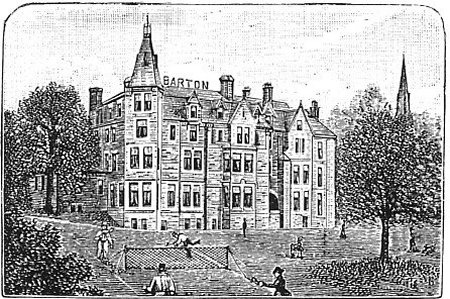
Used in 1932. The final name was LILYBANK
(from a Lilybank Hydro Ltd letterhead).
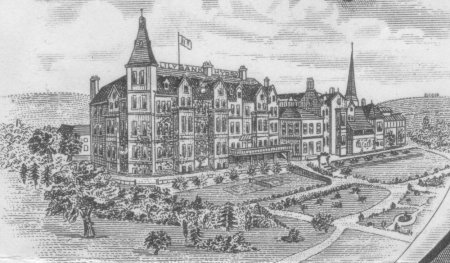
Taken c1923. Accommodation provided for 130 guests. Hydro baths
comprised Russian, Vapour, Packs, Hot Air, Sitz, Shallow, Needle
and Douches etc. Terms in 1923, inclusive of Bedroom, Attendance, Breakfast,
Lunch, Afternoon Tea, Dinner, Electric Light, Baths and Garage, were:
1st Floor: £4 4s 0d to 4 11 0 per week
2nd Floor: £3 17 0 to 4 4 0 per week
3rd Floor: £3 10 0 to 3 17 0 per week
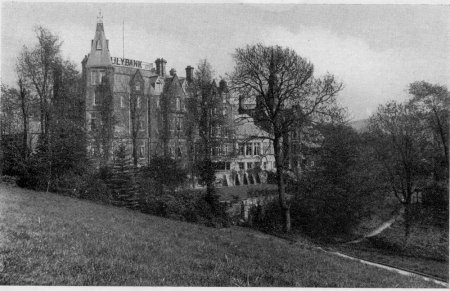
Lilybank Hydro, the Ballroom. Sent by Victoria Cambridge. (see her letter on right). The grand piano was presented to Mr and Mrs
Kay by a number of Lilybank visitors, April 1923.
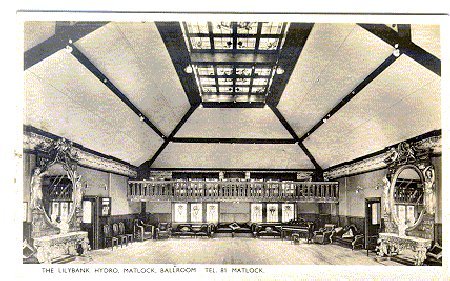
The ballroom was 45 ft long, 34 ft wide, and 21 ft high, and was fitted
with Morton's "Valtor" sprung floor. The gallery running the full width
of the room, with piano, organ, and jazz drums, could seat 40. A bay
window, 35 ft wide, extended into the terrace.
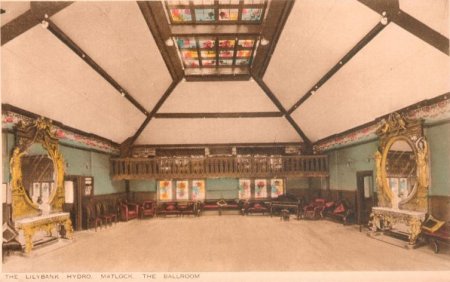
Plan of Lilybank Hydro, about 1923.
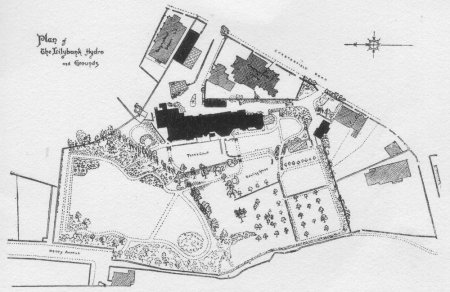
The Dining Room. A specimen menu (for 5 Nov 1922)
was:
Breakfast: Porridge | Fried Plaice | Bacon and Eggs or Bacon and Tomatoes
| Tea or coffee, Toast and Marmalade
Lunch:Scotch broth | Hot Roast Shoulder Mutton, onion Sauce or
Cold roast Beef or Spiced Beef or Roast Lamb and mint sauce or Roast Veal
and Ham or Ox tongue - Sweets:Canary Pudding or Rice and
Semolina Puddings or Stewed Fruit and Custard | Cheese: Cheshire and Roquefort.
Dinner: Soup: ox tail | Fish: Boiled Halibut and shrimp sauce
| Joints: Roast lamb and mint sauce or Roast sirloin Beef and Horseradish
sauce | Roast chicken and bacon, bread sauce |
sweets: Blackcurrant Tart and custard or Lilybank pudding or Wine Jelly
| Dessert
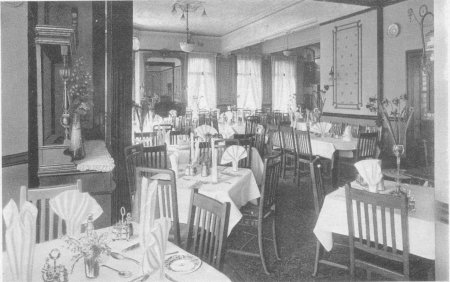
See email from Ewen Cameron on 21apr2012:
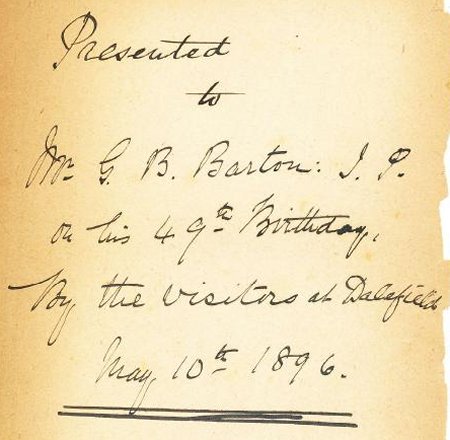
Lilybank Hydro, Matlock
In 1890 George Barton opened a Hydro known as Dalefield, at the junction
of Chesterfield Road with School Road.
The name was changed to Lilybank in 1906, and was the last Hydro in
Matlock to close in 1962.
The building then became a convent school and later a residential
home for old people.
George Barton and his family can be traced in the following Census records:
1851,
1861,
1871,
1881,
1891 and
1901.
George Barton and his family can be traced in the following Census records: 1851, 1861, 1871, 1881, 1891 and 1901.
See also: emails and BARTON tree
Victoria Cambridge writes:
This postcard - there were stacks of them roughly discarded in an
attic room in the "Gables" part of the school. The room was full to the
brim with remants from the hotel, old fancy dress costumes - old fire
scuttles etc. I was only about 8 years old, but knew then that there was a
facinating history to Lilybank. I had the foresight to take a few postcards
in the early '70's
I slept in many bedrooms over the 3 years I was there, most interestingly in the room on the third floor just below the "turret" (left hand side of the rear of the hotel) which by 1972 had been taken down (as it was unsafe) and had been lobbed off.
The rooms were furnished in the old hotel furniture, with mahogany wardrobes - some very ornate and inlaid with compartments lined in green/pink water silk for all sorts of bygone items of clothing, such as gloves and sock compartments, stud drawers etc.
There were the old turn of the century sinks in each room.
The heating was antiquated with old cast iron heavy radiators which were incredibly ineffective. The weather was always so cold and windy - howling gales and snow in those days
The "Lilybank Hydro" signage on the roof of the building was derelict weather beaten. The odd letter was still insitu in 1972 but within a year or so had been removed for safety reasons. The Lilybank letters which had been on the walls (front of hotel on the right hand side) were also removed but you could still make the letters out as it was a lighter coloured brick underneath where they had been
The gables were very spooky and mostly used as music rooms (piano) - although there was one which was a small domitory which housed about 6 girls. The story went that the Gables were haunted by the "White Lady" - most girls rightly or wrongly were slightly afraid of the gables.
The dining room was attached to the kitchen and again original - very Edwardian with a stained glass door and a huge (or it seemed that way for an 8 year old) oak dresser with a mirror overmantle.
The dining room had a brass "gong" hung on the wall, which would be rung signifying meal the beginning and end of meal times. Most of our meals were taken in silence save a few - tea time when we would sometimes get cream buns (on special days) and best of all our post from our parents would be handed out
The "Day pupils Dining Room" was opposite the dining room and I think this had been used in past times as a lounge for hotel residents.
The ballroom was where was all played when the weather was bad - it had none of the furniture you can see in the postcard but had a wonderful wooden floor. The ceiling was stained glass with a simplist late art nouveau style glass. We used to set up the ballroom every Sunday morning for Mass - an altar underneath the band balcony and lots of little chairs with an isle up the middle.
We also used to stage the annual Christmas nativity and plays celebrating St Patrick's Day.
The Sun lounge at the rear was out of bounds to us girls but used by the nuns as their rest room - it was lovely in there in the few times I was invited in .... very cosy and had all the old hotel sofas and cane chairs in it.
There was the original lift just inside the hotel (to the right) with the old gated doors.
The carpet leading up the the bedrooms was plush and red. We were only allowed to use it when we returned with our suitcases for another term. Ordinarily we used the back stairs (around by the kitchen area) - the servants stairs I guess! The sound of all the girls shoes clattering down the stairs was awesome
The basement over the hotel side was totally original - it was furnished with black and white tiling in it and I think this was where the "treatments" were given. We used it every day - as our coats were hung up down there and it was our way out to the grounds to play.
Over the Gables side - the extensive cellars had huge windows overlooking the lawn terrace, and they were, painted half way up in a marroon gloss paint! As children when we misbehaved after lights out, we were sent down there for half an hour or so (in the complete dark and in total silence). It was quite sobering!
The Tennis court was used a lot by us girls, and I got the impression that at some time, it had once been a kitchen garden as rhubarb grew scantily in places and against the back wall were plums and fruit trees. There was an old derelict "summer house" up towards the courts - it was originally painted a light blue but was now faded and the paint peeling. Inside the wooden seats were loose or completely missing - we were not allowed in it
Kind regards
Victoria
High Peak News, 4 Aug 1923 |
The manager and manageress of Lilybank around 1923.
John Sidney Kay was a bath attendant in 1901, and
Elizabeth Connor a chambermaid, both at
Chesterfield House Hydro. They married in 1902
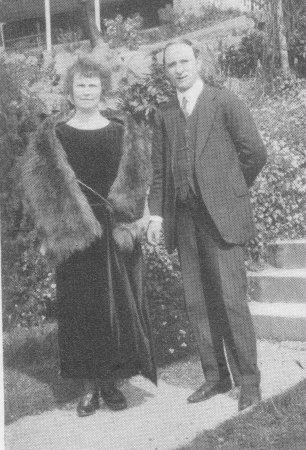
Pewter oil lamp 21" high, Lilybank Hydro c1906, made by Walker and Hall. |
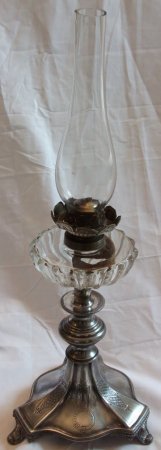
|
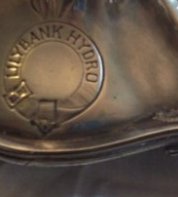 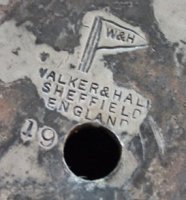
|
Dates:
Photo taken:c1935
Size:Postcard
Source:
Click on photo for enlargement (on CD only)
Have any more information about this photo?
Please e-mail the author on:

